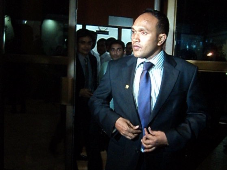A delegation from the Inter-Parliamentary Union (IPU) has arrived in the Maldives in order “to help find ways to improve trust and confidence between State institutions”.
“The frequent intimidation, harassment and attack of MPs as they go about their work have been deeply worrying,” read an IPU press release.
The organisation’s request for an urgent visit was prompted by the growing list of cases – 24 in total – involving Maldivian MPs currently filed with the IPU’s Committee on the Human Rights of Parliamentarians.
Local NGO Transparency Maldives has meanwhile called upon the Supreme Court to ensure that all MPs are treated impartially whilst calling upon members not to abuse parliamentary privileges for personal gain.
The IPU delegation, having arrived on Friday (November 1), will spend one week in the country during which time it will meet with government leaders, senior parliamentary authorities – including Speaker Abdulla Shahid, Police Commissioner Abdulla Riyaz, and members of the Supreme Court.
The group will also meet with President Dr Mohamed Waheed – recently returned from a private trip to Singapore and Hong Kong.
“The mission not only aims to promote confidence and trust between State institutions ahead of the forthcoming election, but also to have a better understanding of recent allegations of human rights violations against members of parliament. These include arbitrary arrests, attacks and intimidation, including death threats,” says IPU head of human rights programmes and mission member, Rogier Huizenga.
The delegation’s arrival follows a fraught week in the People’s Majlis, during which two MPs were unseated by the Supreme Court – a decision subsequently rejected by the speaker.
Meanwhile, Maldivian Democratic Party (MDP) MP Hamid Abdul Ghafoor – who has sought refuge within parliamentary grounds – was handed a six month jail term by the Criminal Court.
Both the verdict for Hamid and for the MPs unseated by the Supreme Court were given in absentia, a tactic the MDP has described as reminiscent of “old autocratic practice”.
Transparency Maldives
Whilst calling for neutrality in the courts, Transparency Maldives (TM) has also condemned what it characterised as “attempts to shape laws and rules for protecting personal interests of the Members of the Parliament and abuse of parliamentary privileges and the institution of the Parliament.”
In a statement last week, TM contended that such attempts “weaken the legal system and obstruct the rule of law. Similarly, such acts undermine the integrity of the Parliament, eroding public confidence in the institution.”
“Members of the Parliament must be provided with appropriate privileges and immunities in order to carry out their duties as lawmakers. However, Transparency Maldives reiterates its concern that the Parliamentary Privileges Act affords undue privileges and powers to the MPs,” the statement read.
The press release followed this week’s submission of amendments to the penal code, the Drugs Act and the parliamentary rules of procedure by the MDP.
The amendment to the penal code seeks to abolish article 81 regarding public servants exercising their authority to detain innocent persons. The MDP presidential candidate and former President Mohamed Nasheed is being charged under the article for the military’s detention of Criminal Court Chief Judge Abdulla Mohamed in January 2012.
The amendment to the Drug Act meanwhile proposes shortening the jail sentence for the offence of refusing a urine sample from one year to 15 days while the amendment to the parliament regulations would allow MPs convicted of a criminal offence to attend parliament and participate in votes.
In addition to his sentence for refusing to attend court hearings, MP Hamid stands charged of drug and alcohol offences, as well as allegedly refusing to provide police with a urine sample.
